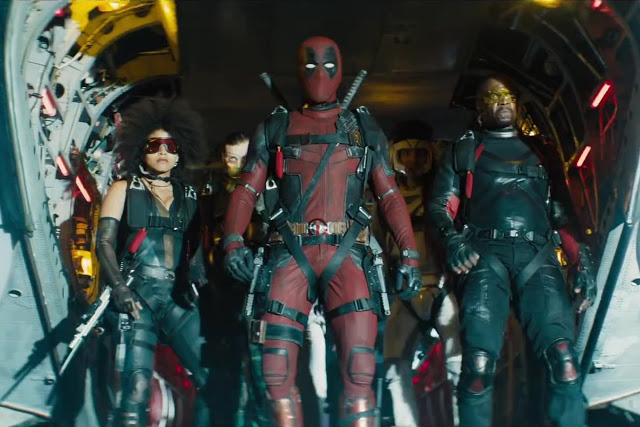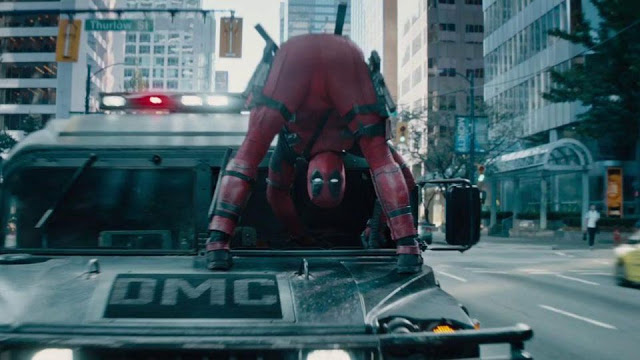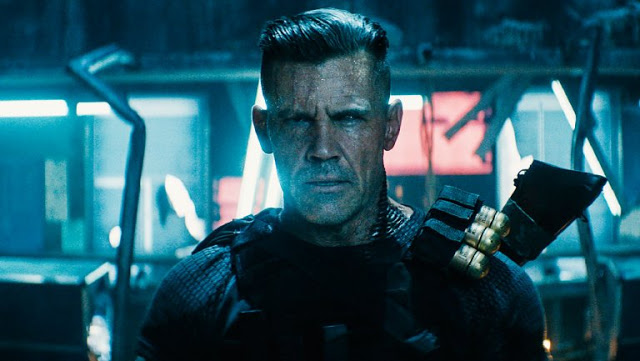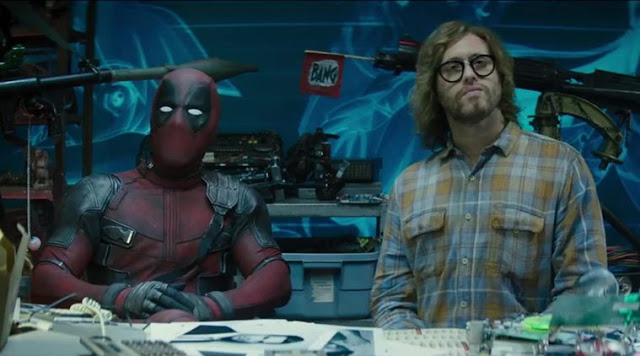The dirty little secret of Deadpool was that, for all its supposed subversiveness—the meta commentary, the vulgar jokes, the extreme gore and relentless profanity—it largely proceeded as a straightforward superhero origin story. So it’s only logical that Deadpool 2 abides by the Law of the Sequel, doubling down on the original’s purported irreverence while also methodically expanding the franchise’s universe and setting the stage for further installments to come. If you deemed the first Deadpool to be an anarchic laugh riot, you’ll likely be sated by this follow-up’s well-stocked buffet of ad-lidded one-liners and bloody carnage. And if, like a certain humorless critic, you found the original to be a mildly clever, philosophically vacant sketch concept that quickly wore out its welcome, well, at least you still get to spend a few hours hanging out with Ryan Reynolds.
Reprising his role as Wade Wilson, the potty-mouthed assassin with a red leotard and a severely burned face, Reynolds receives a co-writing credit this time around (shared with Rhett Reese and Paul Wernick, who scripted the first film), suggesting that the affable actor improvised acre-sized swaths of his dialogue. (In fact, given that Wade spends most of his time wearing a head-to-chin mask, it’s fair to wonder if Reynolds just muttered “insert wisecrack here” while on set, then looped in his gag of choice during post-production.) Here he favors a high-volume approach that seems rooted in the ZAZ school of comedy, the notion that if you keep the jokes flying fast enough, you’ll land enough punches to keep the audience in stitches. And he does land his fair share; apologizing to his girlfriend for arriving home late, Wade explains, “I was fighting a caped badass, but then we discovered that his mom is named Martha too.”
I laughed loudly at that line, which of course is geared to viewers who, like me, watch way too many comic-book movies. Yet the joke also speaks to the smug insularity of the Deadpool films, which operate with a taunting, can’t-catch-me superiority that only exposes their own emptiness. Making fun of superhero pictures is fair game—and lord knows, there’s plenty to mock—but it’s hard not to sense a whiff of defensiveness in Deadpool 2’s persistent post-modernism, as though it’s lashing out at its more grimly serious brethren just to distract you from its own cinematic shortcomings. After all, when Wade presages a climactic brawl between two hulking special effects by announcing, “Big CGI fight coming up!” it hardly minimizes that fight’s essential leadenness. More fundamentally: Does acknowledging your movie’s badness somehow make it less bad?
To its credit, Deadpool 2 does take some half-hearted stabs at being an actual movie, though it makes some dubious choices in the process. My favorite element of the original was the relationship between Wade and fellow mercenary Vanessa (Morena Baccarin), a surprisingly genuine romance that was by turns funny, sexy, and moving. So of course the sequel kills off Vanessa before the opening credits sequence, which once again pokes fun at the film it’s announcing; this time, rather than dubbing Reynolds “God’s perfect idiot”, it labels him as “someone who hates sharing the spotlight”. Ha, ha. Yet Baccarin’s absence—she does reappear in a few dull dream-style sequences—hampers Deadpool 2, depriving Reynolds of a comic partner to spar with and the audience of an appealing character to root for.
Not that Wade is lacking in foils to punch, protect, and insult. The most significant of these is Cable (Josh Brolin, bored), a futuristic warrior with a metal arm and a perpetual snarl. Perhaps returning from a realm that spliced The Terminator with Looper, Cable has traveled back in time to assassinate Russell Collins, aka Firefist (Hunt for the Wilderpeople’s Julian Dennison), an angry and abused teenage mutant with a nasty temper and a talent for flame-throwing. According to Cable, Russell’s thirst to enact vengeance on his tormentors—personified here by an effete and slimy Eddie Marsan—will eventually curdle into an uncontrollable bloodlust that will turn him into a mass murderer, and thus Cable intends to kill him and alter the course of history. (It’s a variation on the classic Killing Hitler paradox, about which, whoops, never mind.) That doesn’t sit well with Wade, who has long been striving to join the X-Men in an official capacity and who determines that Russell—a kindred spirit in spasmodically channeled violence—is a wronged innocent worthy of his superhero safeguarding.
Deadpool 2 takes far too long to get going—Wade and Russell briefly get shunted to a Face/Off-like prison, an interlude where both liberties and laughs are in short supply—but Cable’s arrival ought to give it a boost. Yet while Reynolds and Brolin are both dexterous comedians, their frenemy shtick here never gels, possibly because the latter keeps his performance stuck in first gear. Brolin could play this part in his sleep, but that doesn’t justify him sleepwalking through the part; he gives Cable a standard-issue growl but never bothers to invest him with any wit, menace, or color. It is among the movie’s most predictable jokes that Wade derisively refers to Cable as “Thanos”, but at least Brolin’s Avengers: Infinity War villain carried a real sense of weight. Cable is just dead air.
Thankfully, Wade finds some more entertaining clowns to pal around with. Seeking help, he decides to form the X-Force, a ragtag band of off-brand mutants whose eccentric abilities evoke the quirky sidekicks from Sky High. In the movie’s best sequence, Wade and his bartending buddy Weasel (improv maestro T.J. Miller) conduct a series of job interviews with aspiring superheroes whose talents run the full gamut: There are some impressive physical specimens (Terry Crews and Lewis Tan), a dude who spews acidic vomit (It’s Bill Skarsgård), an invisible man (played in a split-second cameo by [redacted]), and a pleasant middle-aged schlub named Peter (Rob Delaney), who has no special skills whatsoever beyond earnest enthusiasm. These quick-hitting dialogue scenes find Deadpool 2 playing to its strengths, with Reynolds locating a relaxed, playful rhythm with the rest of the cast, in particular Atlanta’s Zazie Beetz; she plays Domino, a preternaturally lucky warrior with a knack for landing on her feet and a no-nonsense attitude that helps fill the vast hole created by Vanessa’s departure. Reynolds and Beetz quickly develop the sharp comic chemistry that he and Brolin strangely lack, and they’re funny enough to make you wonder if the movie should have just ditched superhero pyrotechnics altogether and just lazed around as an enjoyably silly hangout comedy.
But that’s not quite fair, because unlike its predecessor, Deadpool 2 actually features some lithe and energetic action filmmaking. The director here is David Leitch—or, as the credits call him, “One of the guys who killed the dog in John Wick”—and he brings a steadier hand to the movie’s many set pieces. The clear highlight is a hectic assault on an armored transport vehicle that careens through city streets in broad daylight; as the heroes tumble and the bullets fly, Leitch choreographs the chaos lucidly, keeping his players in constant, arcing motion without yanking the camera too sloppily or cutting too rapidly. He also recognizes the movie’s hybrid tone and incorporates plenty of laughs into his staging; a sequence where the freshly assembled X-Force squad attempts to parachute into battle, with hilariously disastrous results, is perhaps the film’s most clever parodic moment.
But effective parody is hard to sustain, and as it drags on, Deadpool 2 feels less like a witty send-up of superhero sequels than another lackluster imitation of them, which is to say that it too crumbles under the weight of its own ambitions. It wants to be both a gloriously awesome comic-book adventure and a fiendishly knowing spoof of said adventures. Yet while there are some suitably robust action scenes and quite a few funny jokes—another dig at Green Lantern, an homage to Say Anything, a runner about dubstep—the film is too patchy to work on either level. It isn’t rousing, and it isn’t sidesplitting; instead, what lingers is an irritating faux insouciance. If you dislike this movie, Deadpool 2 insists, that’s only because you’re taking it too seriously.
Maybe so. But as a big-budget studio production complete with the usual Marvel accoutrements, Deadpool 2 deserves being grappled with, even as it asserts that it’s above criticism. In a sense, the movie critiques itself; whenever he stumbles upon a plot contrivance, Wade sighs, “That’s just lazy writing.” That kind of lampshading practically dares critics to take it as bait, but I’m not inclined to dismiss this film’s failures as the product of laziness. It’s more insidious than that; in insincerely asserting that it’s a bad movie, Deadpool 2 is actually attempting to excuse itself from the obligation of being a good one. That’s why, for all the pithy quips and naughty zingers, the biggest joke is in fact on you.
Jeremy Beck is the editor-in-chief of MovieManifesto. He watches more movies and television than he probably should.





Sounds like Wade got you, Jeremy. You've been suckered into trying to critique a move that doesn't want to be critiqued. This was one of the more enjoyable movies I've seen in awhile; certainly better than the Star Wars reruns that have come out in the last few years. I hope someone from the movie reads this review, and then does a three-quel based on your review. Pleeeeease make this happen!